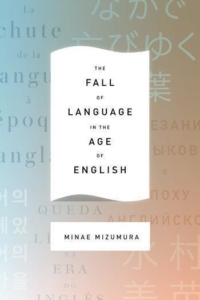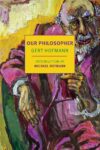 [Columbia UP; 2015]
[Columbia UP; 2015]
Tr. by Mari Yoshihara and Juliet Winters Carpenter
There are few complaints as evergreen as the one lobbed at the popular taste in literature. The problem is often located in the education of children, and nowadays, with books vying with more brightly colored forms of entertainment, the complaint is made in two parts: The kids don’t read enough, but even if they do, they don’t read the good stuff.
It is tiresome to hear. But it is even more tiresome to keep repeating. So it is gratifying that Minae Mizumura, the Japanese novelist whose international stature has grown in recent years, manages to make this complaint immensely interesting in her latest book, The Fall of Language in the Age of English. Part essay, part memoir, part lament, it bemoans the overwhelming influence of the English language in the age of the Internet, a trend that Mizumura convincingly claims constitutes nothing less than a grave national crisis for Japan. And in outlining the miraculous evolution of the Japanese language, and in making the case for its preservation, she manages to transcend Japan’s narrow shores to address more universal concerns of what happens when we forget the classics.
The Fall of Language was an unlikely success in Japan, topping the nonfiction Amazon lists in no small part due to an incendiary debate over the proposals Mizumura makes to reform the Japanese education system. Mari Yoshihara and Juliet Winters Carpenter, the book’s translators, provide in their introduction a few of the criticisms that have been hurled Mizumura’s way: she’s a right-wing, imperial apologist; her recommendations are unseemly, particularly from a woman, as they espouse a “macho” view of Japanese culture; she is, unquestionably, an elitist, and an elitist expat at that, having spent much of her youth in the United States. Others have criticized Mizumura for faulting a system that has allowed her the kind of success that few other authors, not to mention few other women authors, enjoy. Still others question her taste, pointing out that even the Americans she grew up among love the contemporary Japanese writers she so despises. To her credit, Mizumura anticipates every one of these reactions as she makes her argument. But she has a curious blindness to what may be her greatest offense of all to the prevailing attitude of our age: a naive rejection of the idea that novels, and their novelists, exist merely to entertain.
Early on in the book, Mizumura describes a conversation she had with a well-read Japanese friend, with whom she (humorously) agreed that the contemporary Japanese literary scene is filled with “brainless writers of crap.” She then goes on to write this remarkable passage:
Perhaps both she and I belong to a generation so thoroughly imbued with the classics of modern Japanese literature that we don’t know how to appreciate newer writing. Or perhaps most of the newer writing is in fact of lesser value. Long ago, while I was still living in the United States, whenever I thought of what it would be like to finally go back to Japan and start writing novels in Japanese, an image presented itself before my eyes of a deep forest where stately trees stood tall. I would write in their shadows, quietly and modestly, bits of trivial things befitting a woman. Though this was a sorry image for someone who was already getting a taste of gender equality, I had somehow assumed that my country would still be inhabited by men like the giants Fukuzawa Yukichi, Futabatei Shimei, Natsume Soseki, Mori Ogai, Koda Rohan, Tanizaki Jun’ichirō — men of frightening intelligence, knowledge and wit. It had never occurred to me that once I was back in my home country I might not be able to find any deep forest where stately trees stood tall. Yet that was what happened. I spotted a tree here and there, but mostly the scenery was flat. Unsuited even for a poetic description like “bleak wasteland,” it was more like a playground where everything was small and clamorous — just juvenile. I was left to wonder whether my compatriots had forgotten those men I so admired had even existed.
This damning assessment offers the reader unacquainted with Mizumura’s style a window into some of her tics, habits and themes: the seemingly reflexive, yet sly suggestion of humility; the absolute and unsparing judgment, an iron fist couched in the silk glove of her prose; and, above all, her unbridled admiration for a stable of writers who represent the best of modern Japanese literature.
This is a category that refers to the very specific body of work created during the 100 years after 1868, which marked the start of the Meiji era, when Japan discarded its isolationism and its writers and intellectuals were forced to contend with what Mizumura calls “the shock of the West.” In many ways, the book is a love letter to that canon and its classics. The historical account of the evolution of languages and national literatures is offered only as a context by which the reader can understand the excellence of the modern Japanese canon, and the fortuitous circumstances that led to its creation. This in itself is an invaluable service to curious Western readers in search of an introduction to Japanese literature.
What this canon represents to Mizumura, and the reason why she argues that it is fundamentally important to Japanese society as a whole, is that it serves as a bridge for present day Japanese to access a literary tradition that extends in an unbroken line all the way back to the 11th century and Murasaki Shikubu’s Tale of Genji. And the urgency that fuels Mizumura’s despair over young Japanese ignoring these classics stems from the remarkable fact that most young Japanese readers are almost incapable of crossing this crucial bridge, due to a government-mandated change in orthographic style instituted in 1946. It is a mark of how alien the Japanese language is from Western experience; it would be as if books like Walden or Moby-Dick, or, even, 1984, were written in Middle English. And it is this inherent difficulty that presents the greatest danger in an era when English is everywhere; as Mizumura states, “A language that goes undefended will perish. Even if its written word is preserved in books, the books will go unread and so perish.”
Mizumura’s vocation as a novelist, with its attendant love for the written word, is essential to the warning she wishes to deliver to the wider world about the hegemony of English. It is, in addition, essential to the form that warning takes. The Fall of Language is not a scholarly work, despite Mizumura’s rather stunning erudition and range of interest; it is manifestly the work of a novelist. The argument is recursive, rather than linear, and it stems from such a personal place that it would be a mistake to consider it as a treatise on history or linguistics. The care with which Mizumura has crafted this book — weaving argument and narrative and confession — serves on the one hand to blunt any criticism she might receive from a purely historical or linguistic standpoint, and on the other to make the reading of it a pleasure, allowing for wit and personality to shine in what otherwise might be a dry and ultimately dispiriting discourse. And by framing the argument as a gradual, personal realization of her own ignorance of the context from which her own mother tongue was created, Mizumura offers readers a proxy by which they might acknowledge their own faults, see in Mizumura’s initial, casual chauvinism their own witless affection and pride in conditions that they themselves have had no active hand in creating, and open themselves up to the wonder of it all, this writing in many languages, and the terrible and almost certain possibility that much of it will be lost.
This certainty points to a persistent fatalism that seems to crop up in Mizumura’s work. There is no corrective proposed to the constant onslaught of English on every other written language, which will continue apace no matter what anyone, or any nation, does. But Mizumura does not take this certainty as an excuse for inaction; instead, she asks the novelists like herself, who persist in the folly of writing in their own languages in ways that either consciously or unconsciously defy translation, to take up the good work of preserving their canons, their unique national libraries. Mizumura says of such novelists that they are “condemned to perpetually reflect upon language,” and upon the fact “that there are other ‘truths’ in this world that cannot be perceived through the English language.”
It is ultimately a conservative stance, and it is a measure of the prevailing forward-looking spirit of the times, both in Japan and abroad, that Mizumura has been labeled a reactionary. It is also rather unremarkable: as often as it’s lamented the world over that children fail to appreciate the classics, it just as frequently stated that one cannot make progress without appreciating the past. Mizumura’s complaint about Japan is that in its zeal to adapt to the era of English, it is not only hurrying a long history of literature into obsolescence and ruin, but also creating atop its ashes a body of literature that is, to use her word, crap.
In the end, Mizumura offers writers around the world another path, and reminds them that the aim of great literature is excellence, not an appeal to the global masses. She points out that the quality of Racine’s work does not suffer because the world is now more familiar with Shakespeare; she goes further to argue that the French as a whole shouldn’t care either, so long as they choose to remember Racine and his work well. “Art is not democratic. Art is sublime,” Mizumura baldly states, and she is right. The danger presented to writers writing in their own languages is that if they aim to have the global reach of, say, the Harry Potter series, they will necessarily have to discard much of what makes their writing unique to appeal to publishers in New York and London, a Faustian bid for riches and renown at the expense of chipping away at a nation’s soul.
Of course, it is easy for Mizumura to take this stance; she is an uncommonly talented author who has enjoyed success. Despite being uncompromising in her decision to resist writing books that are easily translated into English, A True Novel, the first of her novels that has actually been translated into English, proves that she is not the Japanese woman she envisioned humbly toiling in the shadows of her betters; she is in fact one of those towering stately trees that writers not only in Japan, but all around the world, can look up to for inspiration. One of the best reasons to read this book is for the insight it provides into the writing of one of the great authors of this, or any, generation.
Mizumura has few recommendations for native English speakers, save to sniff near the end that it is advisable to learn a foreign language, and that it would be polite to adopt an attitude of humility regarding the current and future dominant status of English. But in her praise of the classics, she offers a warning and a reminder: excellence in literature is the product not just of luminous minds, but of a culture that lays the groundwork for the talented to operate within, a culture that truly values the worth of all the great work that has come before. While English literary culture is not under external assault by another language, it is beset on the one side by competing forms of entertainment media, and on the other by a Panglossian view of the way the Internet has leveled the playing field. We are often told that the gatekeepers are obsolete, and now is the time for the tastes of the masses to reign supreme; the best will rise to the top not because of any inherent quality, like that tired metaphor involving cream, but because of e-book sales and franchise opportunities. The complaint about people in general not appreciating the classics, while correct, is nevertheless inconsequential, for in art the majority view has little power beyond a few decades; what matters is that the minority — the self-selected few who claim to care about a literary quality that embodies the idea of art as sublime — is truly conversant with the classics and is actively appreciative. And while only a select few of any generation have the talent, drive and inclination to become one of those tall stately trees that tower over all creation, there is room enough for legion on the ground, and there is always much work and tidying up to be done.
Sho Spaeth lives in New York.
This post may contain affiliate links.







